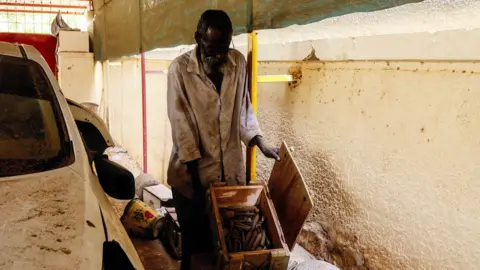The United States has announced that it will impose new sanctions on Sudan in response to findings that the country utilized chemical weapons during the ongoing civil war. This decision, communicated by State Department spokesperson Tammy Bruce, arrives amidst a human rights crisis in Sudan, where a brutal conflict between the Sudanese military and the paramilitary Rapid Support Forces (RSF) has resulted in extensive loss of life and widespread suffering.
Beginning June 6, the sanctions will impose limitations on U.S. exports to Sudan and enforce restrictions on financial borrowing. The civil war, which has raged for over two years, has claimed more than 150,000 lives. Both the Sudanese military and the RSF have been accused of committing war crimes throughout the brutal fighting for power, particularly as the conflict intensified after their initial struggle began in 2023.
In a notable development, there have been unconfirmed reports regarding the specific types of chemical weapons allegedly employed by Sudan. A report from the New York Times earlier in the year indicated that chlorine gas was used on two separate occasions, a toxic substance known for its potentially fatal effects. The U.S. has urged Sudan’s government to halt all use of chemical weapons, emphasizing its demands grounded in international law, specifically the Chemical Weapons Convention (CWC). The convention, which Sudan is a signatory to, obligates its members to refrain from developing, producing, stockpiling, or using chemical weapons.
The dire situation in Sudan has resulted in displacement for approximately 12 million citizens, with 25 million people—well over half the population—now reliant on food aid. As the Sudanese military seeks to regain control of Khartoum, clashes persist across other regions, exacerbating the humanitarian crisis.
The new sanctions against Sudan are not unprecedented; indeed, they follow a previous round of sanctions imposed in January targeting leaders from both factions in the civil conflict. U.S. officials allege that Sudan’s military leader, Abdel Fattah al-Burhan, is destabilizing the country and undermining efforts toward a democratic transition. In tandem, Mohammed Hamdan Daglo, head of the RSF, has been accused of genocide, intensifying international scrutiny of both leaders’holds on power.
While the U.S. sanctions aim to address the deepening crisis, experts believe that their impact may be limited due to previously imposed restrictions. Furthermore, the recent sanctions have also heightened tensions regarding the involvement of the United Arab Emirates in the conflict. Allegations have surfaced that the UAE supplied arms to the RSF, a claim that the UAE has vigorously denied. The complexities of international relations in this crisis have only increased as the U.S. has sought to block arms sales to the UAE from the American defense industry, attributing part of this concern to the Gulf state’s alleged involvement in the Sudanese conflict.
Beyond immediate geopolitical implications, Sudan’s humanitarian predicament continues to draw international condemnation, particularly from the United Nations, which has expressed alarm over credible reports of civilian casualties. There is a growing concern about the devastating impact the civil war has had on Sudan’s cultural and historical landscape, particularly regarding the destruction of museums and historical artifacts.
As Sudan navigates its turbulent environment, both the civilian population and international community are left grappling with the ongoing ramifications of chemical warfare, humanitarian crises, and political instability, amid a backdrop of international law and accountability that underscores the plight of millions displaced and suffering from this internal conflict.



